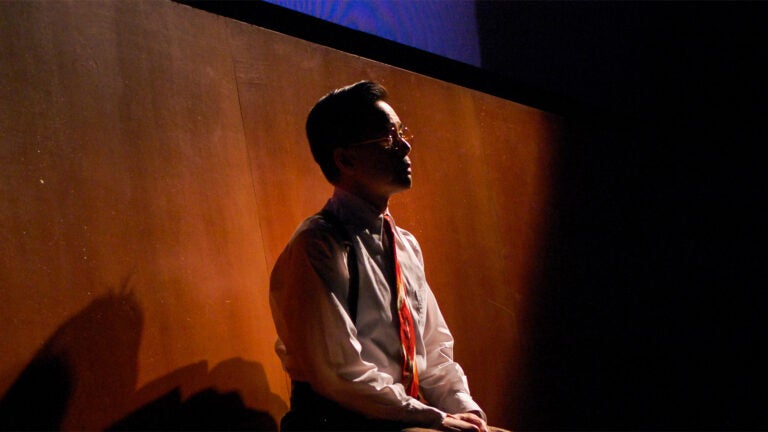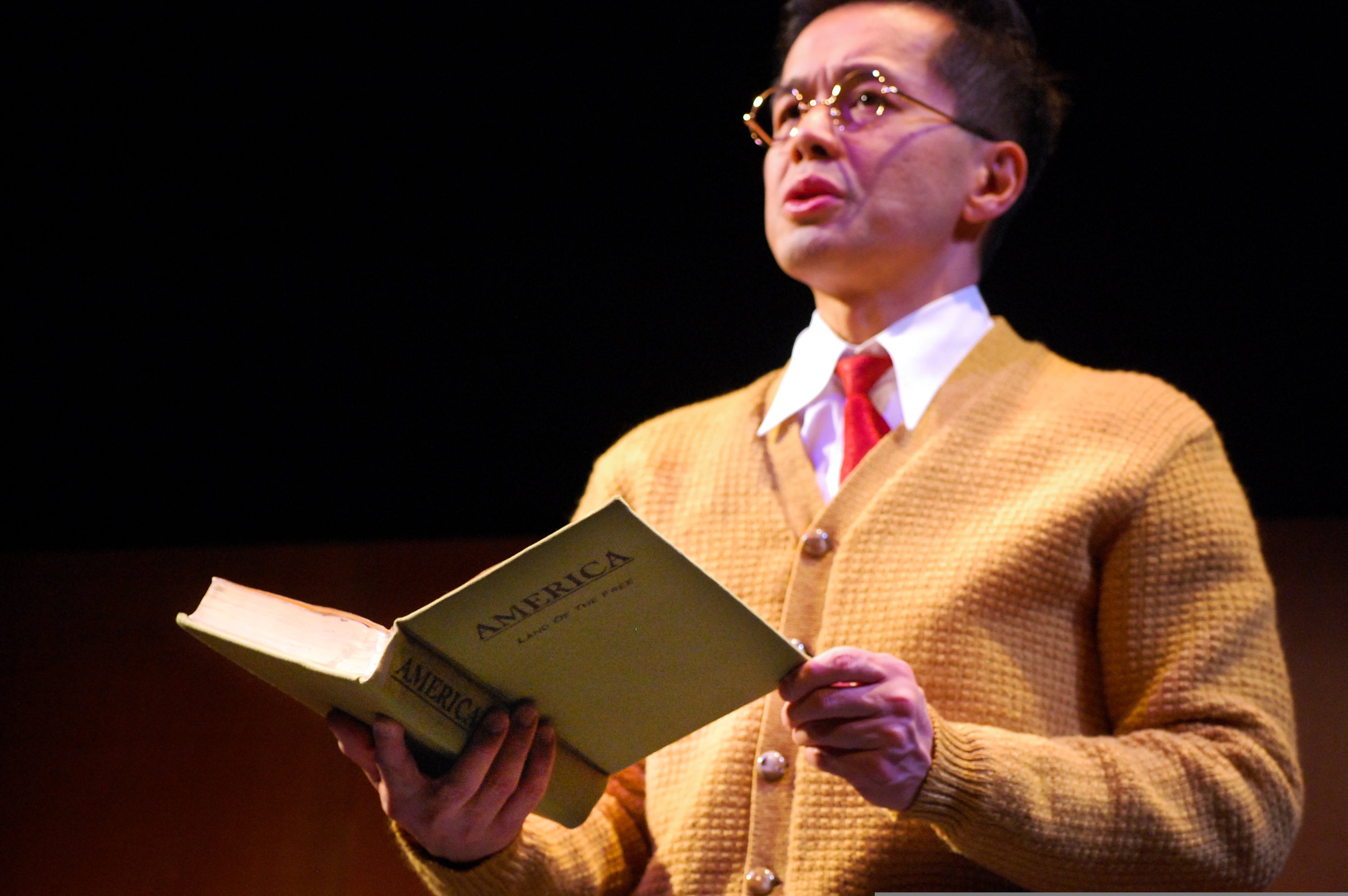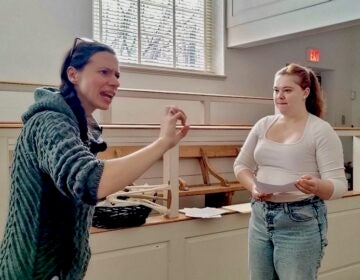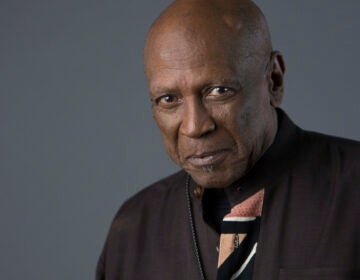My journey bringing Gordon Hirabayashi to life in a solo play inspired by the WWII internment opponent
Actor Stephen Eng, who portrays Gordon Hirabayashi in the one-person show "Hold These Truths," writes about settling into the role.

Steven Eng as Gordon Hirabayashi in "Hold These Truths." (Photo by Charles T. Brastow)
What was it like to work on Jeanne Sakata’s “Hold These Truths”?
When I was first approached for this project, I was struck by how this one-person play, inspired by Gordon Hirabayashi’s fight for his constitutional rights during World War II, spoke to current events on varying levels. The rhetoric and actions on immigration coming out of the nation’s capital over these last few years was enough to mark this play as relevant for our times. But now with COVID-19 quarantines, the economic crisis, and the social movement against racial injustice, the play has so much more to say. And there was something about this man and his story that felt close to me. I seized the chance to tackle it.
When I first stepped into the rehearsal room back in late February, I was confronted immediately with the tremendous mountain I was expected to climb. The task was intimidating, beyond even the logistics of learning over 40 pages of lines, portraying over 30 characters in over 90 minutes, and remembering the order of the scenes and the staging. I also feared confusing — or even worse, boring — audiences.
However, most daunting to me was my responsibility of doing justice to the life of this singularly remarkable American sociologist; to humanize the truth of his struggle to hold onto his principles in the face of the most powerful of opponents, the United States government.
Early in the rehearsal process, we had lengthy discussions about Gordon’s thought processes and obstacles. Where were his thoughts coming from and why? What was the impact of that first memory when he realized he was different than most other people around him, when others scorned him for that difference, and how did he carry the experience with him as he grew older?
Each time he was confronted with another discriminatory act, individual or systemic, what made him reject and oppose that oppression? What made him act against many in the Japanese community who insisted that compliance was the best way to demonstrate American loyalty? Specific to the script, what did he want in each scene, and how did he try to get it? What were Gordon’s motivations that could help me move forward to the next moment?
Continually asking questions and seeking answers was how we proceeded.
Discovering that I identified with Gordon in many ways began to provide a path for me to follow in answering some of these questions. There were deeply personal similarities between us from which I could draw. Though half a century separated us, our parents arrived from East Asian countries with limited English proficiency and little financial means. The Hirabayashis farmed the land and sold their crops at market, mine worked at restaurants in front of hot woks. They relied on their instincts to create safety and stability for their families, finding communities and navigating this new world with knowledge from the old.
Like me, Gordon grew up with the traditions and beliefs of his parents’ own upbringing. For many years, unknowingly, I straddled two different cultures. As a child, I sat through Baptist sermons in Chinese, perhaps like Gordon’s Japanese prayers. I ate Cantonese dim sum and Texas BBQ, drank sweet soy milk as well as sweet iced tea. Not all that different from Gordon picnicking with chicken teriyaki and tsukemono pickles with banana cream pie for dessert. We were children of hard-working immigrants, assimilating unawares.
I was also the first generation in my family to go to college, navigating a new way of life for which I could not prepare. I met and befriended classmates from seemingly everywhere. There were students from all over the U.S., and from Thailand, England, Mexico and more. They ranged from the middle-class to the one percent. I began to see possibilities I couldn’t have seen before. Gordon, too, saw great opportunities, but also great injustices directed at Americans like himself, not faced by even his international friends. As he learned what life was like away from how he grew up, he also began to see how those opportunities were being withheld from him systematically.

Sharing cultural norms, particularly involving family responsibility, was also helpful for me. There is the obligation that can come with being the oldest son. In an interview Gordon gave, he mentioned the weight of his decision to resist his role as the dutiful son by defying his parents and choosing principle over family, a burden he carried during his time in jail. I related to the heaviness he experienced when he rejected traditional expectations and decisively opposed the evacuation order. In my own way, my decision to pursue a career in the performing arts shunned the path I was expected to take as the only son in my family.
While my career as an actor has taken me from off-Broadway to London’s West End, Germany, and Cambodia, performing Shakespeare to Sondheim, this was the first time I had taken on a one-person play, a test both thrilling and challenging. From my experience, I’ve learned of the great pleasure in playing a scene with another actor and experiencing the immediacy of the present moment. You take what your scene partner has served you and volley it right back without a second thought, and then back again it comes. This explosive exchange of shared energy can leave an actor breathless with the experience, like you’re flying.
Generating that kind of immediacy was harder without a scene partner. Could I see, hear, and feel the needs of one character, and then immediately experience the opposing view of another? How could I help the audience feel the frustration of both Gordon and his mother arguing from their unique points of view? I needed to train myself to think fast enough without losing each character’s specificity and clarity, so that people watching could experience the emotional nuances of a scene as if there were two different people in the heat of an intense exchange.
With each rehearsal, each line memorized, each scene of the play staged, I felt a little closer to Gordon. I sensed how his awareness of being “other” influenced the way he saw the dozens of other characters in the play — how different backgrounds informed different perspectives, how some people experienced shared events differently, and how he made efforts to understand why some opposed his views while others supported them. I found this insight helpful in making distinctive character choices. In this way, Gordon’s journey in the world became clearer with each unique person he encountered, and he began to see people with eyes that were a little wiser, from his parents to his best friend, from Hopi Indians to U.S. Supreme Court justices. As ideas became more concrete, decisions more clear, and I became more comfortable, I felt the pieces start to come together and Gordon’s story start to be told.
But after a few weeks of rehearsal, COVID-19 brought the process of “Hold These Truths” at People’s Light to its end in mid-March. After so much hard work from the remarkable artistic and production teams, theater staff and supporters, our exciting journey was halted before we were ever able to present our work to a live audience. While that remains true to this day, that can’t dampen the reward of the project itself, and the fulfillment of this actor’s dream, that of performing something that pushed me to my limits and demanded my best each step of the way.
So it’s with deep gratitude from me that we were able to preserve the People’s Light production of “Hold These Truths,” and that it will be shared with so many more people this way. The play’s message of hope and justice will have the chance to speak to audiences, adding an important and hopefully healing voice to these confusing and complicated times. Gordon would be proud of that.
Steven Eng has been a theater professional for over two decades, continuing to work extensively in New York City as an actor, director, instructor at New York University’s Tisch School of the Arts, and as a voice/speech/text specialist in consulting. He is a founder of the nonprofit National Asian Artists Project. Mr. Eng portrays Gordon Hirabayashi in “Hold These Truths,” a solo play that will air on WHYY-TV 12 Thursday, September 24, at 9 p.m.

Get daily updates from WHYY News!
WHYY is your source for fact-based, in-depth journalism and information. As a nonprofit organization, we rely on financial support from readers like you. Please give today.




